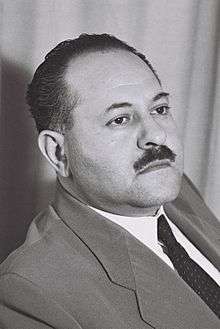Moshe Sneh
| Moshe Sneh | |
|---|---|
 | |
| Date of birth | 6 January 1909 |
| Place of birth | Radzyń, Russian Empire |
| Year of aliyah | 1940 |
| Date of death | 1 March 1972 (aged 63) |
| Knessets | 1, 2, 3, 4, 5, 7 |
| Faction represented in Knesset | |
| 1949–1952 | Mapam |
| 1952–1954 | Left Faction |
| 1954–1972 | Maki |
Moshe Sneh (Hebrew: מֹשֶׁה סְנֶה, Moshe Kleinbaum; 6 January 1909 – 1 March 1972) was an Israeli politician and military figure. One of the founders of Mapam, he later joined the Israeli Communist Party (Maki), and was one of the leaders of a more pro-Israeli split in 1965.
Biography
Sneh attended high school in Poland before studying natural sciences, mathematics and medicine at the University of Warsaw, gaining an MD in 1935. Whilst a student, he was a member of the Yardinia Zionist student organisation, becoming its chairman in 1926, and was also chairman of the Medical Jewish Students Union.
He became the editor of the Nowe Słowo newspaper in 1931, and the political editor of HaYanet in 1933. In 1932 he had been elected to the central committee of the Zionist Federation of Poland, and was a leader of the radical Zionists. In 1935 he also became a member of the Zionist Executive Committee.
He worked as a doctor until 1939, including in the Polish Army following the outbreak of World War II, and immigrated to Mandatory Palestine in 1940.
Upon arriving in Mandatory Palestine, he joined the Hagana, and was head of its national staff between 1941 and 1946. In 1944 he joined the Jewish National Council, and was also a member of the Assembly of Representatives. Between 1945 and 1947 he sat on the board of the Jewish Agency, heading its illegal immigration department. In 1946 he became head of the Agency's political department for Europe. Sneh's name was on the British Police's list of people to arrest in Operation Agatha, but he avoided arrest by fleeing to Paris.
In 1948, Sneh joined Mapam and was appointed deputy editor of the party's newspaper, Al HaMishmar, a position he held until 1953. In 1949 he was elected to the first Knesset. Re-elected in 1951, he was part of the group that split from the party in 1953, when false accusations against its envoy during the Prague Trials led to the party renouncing its support for the Soviet Union. Sneh initially formed the Left Faction, before joining Maki in 1954.
He was returned to the Knesset on Maki's list in the 1955 elections, but narrowly missed out on retaining his seat in 1959. However, he entered the Knesset only six weeks after the election as a replacement for Meir Vilner. Re-elected in 1961, Sneh remained in Maki when two of the party's MKs broke away to form Rakah in 1965. He lost his seat in the 1965 elections when Maki was reduced to one seat (most of its vote having gone to Rakah), but returned to the Knesset again in 1969, remaining an MK until his death in March 1972.
His son, Efraim Sneh, served as both Health and Transportation Minister for the Labour Party before leaving the Knesset in 2008 to form his own party, Yisrael Hazaka.
Bibliography
- Conclusions on the National Question in Light of Marxism-Leninism (1954) (in Hebrew)
External links
| Wikimedia Commons has media related to: Moshe Sneh |
- Moshe Sneh on the Knesset website
- Moshe Sneh's biography Knesset website (in English)